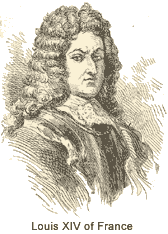Up to the eve of the explosion of European exploratory and colonizing activity, France had been embroiled in the enervating Hundred Years' War (1337-1453). That series of conflicts started in a quarrel over the succession to the French throne; Edward III of England had made a claim. French military defeats were compounded by the horror of the Black Death, the predations of lawless, marauding gangs in the countryside, and a bloody peasant revolt. If that were not enough, the French also suffered humiliating peace agreements and loss of territory to their English rivals.
The tides of the conflict began to shift in favor of the French in the 15th century. Joan of Arc led her countrymen to a stirring victory at Orléans in 1429. By 1453, the English presence was reduced to the single city of Calais on the English Channel across from Dover.
Considerable order and prosperity was returned to France, particularly during the regime of Louis XI (ruled 1461-83), when the king consolidated power at the expense of jealous local nobles.
By 1500, France was regarded as a major power in Europe, but would once again become involved in protracted warfare, this time with the commanding House of Hapsburg as its major rival.
 In the early years of the Protestant Reformation, Lutheranism made little headway in France. However, Calvinism enjoyed widespread appeal; its followers adopted the name of Huguenots. The Wars of Religion, beginning after 1560, tore France apart as Catholics and Protestants vied for supremacy. Henry of Navarre, the Protestant leader, was crowned as Henry IV (r. 1589-1610), but only after he converted to Catholicism. The reigns of Louis XIII (1610-43) and Louis XIV (1643-1715) cemented the primacy of Rome in French religious affairs.
In the early years of the Protestant Reformation, Lutheranism made little headway in France. However, Calvinism enjoyed widespread appeal; its followers adopted the name of Huguenots. The Wars of Religion, beginning after 1560, tore France apart as Catholics and Protestants vied for supremacy. Henry of Navarre, the Protestant leader, was crowned as Henry IV (r. 1589-1610), but only after he converted to Catholicism. The reigns of Louis XIII (1610-43) and Louis XIV (1643-1715) cemented the primacy of Rome in French religious affairs.
Louis XIV, the Sun King, led France to the pinnacle of power in European affairs. His glittering court at Versailles was without rival. The French, however, gathered so much power during the 17th century that resentful nations began to ally against them.
Early French Exploration and Colonization
The French were somewhat slow to develop an interest in the New World. It was only after a French privateer captured a Spanish ship laden with Mexican gold and silver that attentions were directed westward. Spurred by dreams of great wealth, Francis I (r. 1515-47), dispatched three navigators to the New World, the first two of whom were instructed to discover a Northwest Passage to India: